Christos Anesti
christ is risen
What was the secret of the Civil Rights Movement lead by Martin Luther King, Jr? Alinsky notwithstanding, it was more than just appealing to the "middle class" or making friends and conciliating enemies. America's Civil rights movement was rooted and grounded in the biblical religion of black Christianity, the so-called gospel or evangelical heritage. The Montgomery Improvement Association was all about those core values. The Southern Christian Leadership Conference (SCLC) was all about those core values. The National Baptist Convention was all about those values. For Martin Luther King there was no escape. It was ALL ABOUT JESUS.
Christos Anesti
christ is risen
The Civil Rights Movement was led by ministers and grew out of their roots in the ministerial association known as the National Baptist Convention, USA, Inc., under the leadership of the Rev. J.H. Jackson. Jackson spoke for many of them when he declared: "Our acceptance of Jesus Christ as our personal Savior is based on His message from the Sermon On The Mount, His personality and life force that He sheds in the gospel writings and through the revelation of truth that comes to us in all the epistles of the New Testament."
GOD'S . . .WIDE . . . MERCY
Now notice what Jackson's younger colleague Martin Luther King wrote. Paraphrasing the Apostle Paul, he wrote that the Pauline doctrine of salvation by grace, that "faith is man's capacity to accept God's willingness through Jesus Christ to rescue us from the bondage of sin. In his magnanimous love, God freely offers to do for us what we cannot do for ourselves. Our humble and openhearted acceptance is faith. So by faith are we saved."
The authentic message of Jesus seems to be one of inclusion, of welcome, of forgiveness and love and diversity. Leslie Weatherhead said, "Christ's gospel breathes the very atmosphere of love, liberty, gaiety, forgiveness, joy and acceptance." No wonder it was called the good news, eu - angelion. "The Gospel."
Returning to the African roots of the gospels, Iyanla Vanzant would add that your soul is saved when you accept that the very Spirit of God lives in you. She specifically says, "When you can look at yourself, accept who and what you are and love yourself unconditionally, your soul is saved. Your spirit is empowered."
There is none other name under heaven given among men, whereby we must be saved. (Acts 4:12)
King amplifies the theological rudiments of his faith. Citing Tolstoy's conversion experience, King declares: "Herein is the answer to a perplexing question. .... Evil can be cast out [only] when we open the door and accept God through Jesus Christ to enter." [from King's Strength to Love]For there is one God, and one mediator between God and men, the man Christ Jesus. (I Timothy 2:5)
Jesus appeals to man: 'Behold, I stand at the door and knock: if any man hear my voice, and open the door, I will come into him, and will sup with him, and he with me.' Revelations 3:20. Martin Luther King explains this passage: "God is too courteous to break open the door, but when we open it in faith believing ... will transform our sin-ruined lives into radiant personalities."
This is the "good news" or the eu-angelion of the southern Gospel pouring from the heart of Martin Luther King. In reality, it is historic Christianity at its best, a message of hope and transformation. In a retrospective comment, King recalls how enamored he was first encountering the intellectual stimulation he found outside of his southern fundamentalist upbringing. It was particularly at Crozer in Philadelphia that he became acquainted with these new and challenging ideas, with the concept of the natural goodness of man, and the implicit optimism of Enlightenment rationalism.
Return to the depths of traditional faith
But in the end, he came to regard the over-optimism of the liberal view of man to be flawed. Discovering the neo-orthodoxy of such theologians as Reinhold Niebuhr, as well as John Coleman Bennett and Robert Lowery Calhoun, he retreated from theological liberalism. He ultimately took refuge in the depths of his own Southern Black gospel version of neo-orthodoxy. Deep into the Civil Rights struggle, King wrote:"There are some who still find the Cross [of Christ] a stumbling block, others consider it foolishness, but I am more concerned than ever before that it is the power of God unto [social and individual] salvation. ... More than ever before I am convinced of the reality of a personal God." See 1 Corinthians 1:23.America Ye Must be Born AgainI see no other way to interpret the bedrock gospel message of King but as a call both collectively and individually, to turn back to God. We can attack his fundamentalism, we can belittle his Bible-thumping evangelical heritage and style, or his frequent reference to King James Verses in the Bible. But the power and impact of Martin Luther King just will not go away. He points us to Jesus, the hero with a thousand faces, the author and finisher of our faith, the one mediator between God and man -- the man Christ Jesus.
(see King's sermon, "America ye must be born again")
President Kennedy said, This country cannot afford to be materially rich and spiritually poor.
Against the backdrop of the redeeming power of Christ, King saw the utter dependence and need of man. Man's feeling of dependence was Schleiermacher's theme, but King's inspiration was less Schleiermacher than the Bible.... and his own southern Black gospel tradition. It was to these depths of historic Christian faith that King returned.King proclaimed:
We hate to be told that man is a sinner. Nothing so insults man's pride. We have tried desperately to find other words -- error of nature, absence of good, false concept of mind -- to explain the sin of man. Turning to depth psychology, we attempt to dismiss sin as the result of inner conflicts, inhibitions, or a battle between the 'id' and the 'super-ego.' [in Strength to Love]But then he quotes Isaiah: "All we like sheep have gone astray," and he declares: "Man is a sinner in need of God's forgiving grace." And what is the source and fountain of that grace -- who else -- the Hero with a thousand faces.Political liberal, moral conservative
The logic for King is as simple and clear as to be all but self-evident: "God's unbroken hold on us is something that will never permit us to feel right when we do wrong or to feel natural when we do the unnatural."
So here we see a paradox. Martin Luther King the political liberal is also Martin Luther King the moral conservative. Far from endorsing modernism and moral relativism, King denounces the drift away from moral absolutes. He calls for America to oppose the false gods of materialism and atheistic humanism, and states emphatically his rejection of the "grand illusion that man, unaided by divine power, can save himself and usher in a new society." King was no utopian idealist, but an old time Southern Black Gospel pulpit orator. That is, he was every bit a traditional biblical preacher, and despite his considerable learning and scholarship, held fast to the old truths rooted and grounded in the Black church tradition.
"Man cannot save himself, for man is not the measure of all things and humanity is not God. Bound by the chains of his own sin and finiteness, man needs a Saviour."
Sin is sin, wrong is wrong, and salvation is still to be found only in Christ Jesus. Is there anything more traditional than that for a preacher of the gospel of Jesus Christ? There can be no doubt that King upheld to the very end the Christian system of "absolute moral values," as well as the affirmation that "God has placed within the very structure of this universe certain principles that are fixed and immutable." [Strength to Love]
In his "Give us the Ballot" speech, King declares that personhood and power of God, that he is not some Aristotelian "unmoved mover" but that He cares about justice and truth, that his arm is not shortened. This God is no deistic abstraction, but a living force, a Father, a Judge, a Saviour.
"There is something in our faith that says to us, 'Never despair; never give up; never feel that the cause of righteousness and justice is doomed.' There is something in our Christian faith, at the center of it, which says to us that Good Friday may occupy the throne for a day, but ultimately it must give way to the triumphant beat of the drums of Easter."
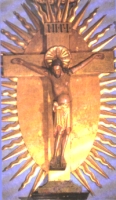
Martin Luther King began one of his sermons proclaiming:
"Every time I look at the cross I am reminded of the greatness of God and the redemptive power of Jesus Christ. I am reminded of the beauty of sacrificial love and the majesty of unswerving devotion to truth. It causes me to say with John Bowring:[FROM A SERMON BY Martin Luther King, Jr ....In the cross of Christ I glory, Quoted in Strength to Love] |
What is the Book of Enoch?
|
The Book of Enoch are the Ethiopian writings of the Old Testament predating Noah and Moses. These were rediscovered within the Dead Sea scrolls. The Book of Enoch was extant centuries before the birth of Christ and yet is considered by many to be more Christian in its theology than Jewish. It was considered scripture by many early pre-gentile Christians. The earliest literature of the so-called "Church Fathers" is filled with references to this mysterious book. For many centuries this book has been misunderstood, as it expounds on Genesis 6 concerning a race of fallen angels mating with women, the birth of their offspring (the giants, AKA the Nephelim), the origins of demons, and what we know today as UFO's & "aliens." The book further prophesied the coming of a messiah (Jesus) who will judge the wicked and save his elect at the end days. For the first time ever, the ancient mysteries are being unsealed. As it is written, in the last days, "many shall run to and fro, and knowledge shall be increased." Now the book of secrets, the record of Enoch has been opened and is now widely available to anyone who dares to rediscover the hidden truth found in this book which has been hidden for ages. May only the worthy drink therefrom
http://sanantonio.olx.com |
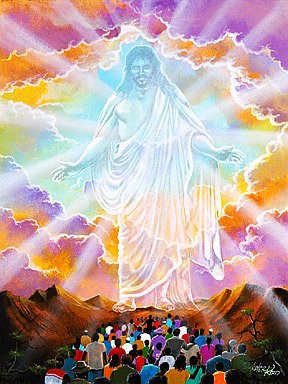
Jesus as the spokesperson or the press secretary, of the Godhead
v
Did pagan god-saviors prefigure the coming of the Jewish Jesus?
See Kersey Graves. the World's Sixteen Crucified Saviors (or Christianity Before Christ)
Pointing to Jesus
Many other heroes, saviours, and god-men
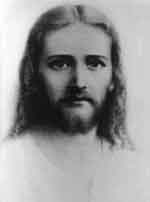 Sananda |
 Kuthumi |
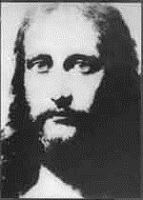 Maitreya |
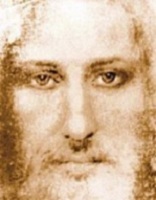 The Word |
Other examples might also include Krishna, Mithra, Osiris, Thoth, Prometheus, Buddha, Vyasa, Quetzalcoatl
Martin Luther King, the "American Moses" as well as the southern gospel tradition, represent an all-American "evangelical" heritage, steeped as it is in the Hebraic idiom of biblical Christianity. See our Gospel Roots. That heritage, even from the days ot the Puritans (Boston) and the Pilgrims (southern Mass), gravitated to a biblically informed grassroots version of Christianity. But what the Bible spells out with literal flavor, other sources of wisdom just as certainly also echo, and with equal power. More on America's religious cultureThe Christian tradition invokes biblical authority, and within the biblical pages can be found messianic indicators pointing to the personalism of a god-man, Jesus Christ. But there are other traditions. There are non-biblical traditions that seem to reverberate with an identical messianism, or as anthropologists have called it -- hero worship. See other Christs and Avatars
Thus, by unearthing certain prophesies of the Hebrew Bible, say Christians, we find scriptures pointing inescapably to the coming messiah Jesus. How interesting that the non-biblical myths (mythos) equally point to the god-man type, the universal savior, Christ Jesus the Lord. True enough, some of these gods or heroes were great suffering champions. Others were actually dying-and-rising god-men. Over a hundred years ago, a quiet man named Kersey Graves pored over ancient texts and discovered many of these "christs" -- including sixteen who were crucified (impaled) uncannily similar to Jesus own crucifixion.
With slight variations, these Suffering Heroes or "Atoning Saviours" can be found in literally dozens of traditions around the globe. The entire subject could be a whole field of study. It is fascinating. C.S. Lewis and J.R.R Tolkien have taught us that "Christianity fulfilled paganism" and that "paganism prefigured Christianity." The fact that these (so-called Pagan) Christs in a sense prefigure or point to the human Jewish historical Jesus -- is amazing. And shocking. Lewis and Tolkien took a great deal of academic heat (and theological as well) for their own bold views in this matter. (Resource)
Chuck Colson defends these two, writing: that "for Lewis and Tolkien, it was this universal fascination with the savior-god myth that made Christianity so convincing. To them, the historical fact of the life, death, and resurrection of Jesus rouses our deepest longings in the same way as the tales of Isis, Horus — and even Harry Potter do. But unlike these stories, Christianity is true — the reality to which all of the best stories of history point."
But Kersey Graves was the great modern pioneer. Saint Augustine may have delved deeply into this area back in the days of the Fathers of the Church, but Kersey Graves built afresh, with recently discovered information and using his own research.
As we have learned more details about more ancient religions, we have discovered that the dying-and-resurrecting god motif is actually a very common one in world mythology. In his classic work The Sixteen Crucified Saviors (which see), Kersey Graves describes many dying gods and their cults, including the black Krishna, as well as Sakia, Thammuz, Wittoba, Iao, Hesus, Quexalcote, Quirinus, Prometheus,Thulis, Indra, Alcestos, Atys, Crite, Bali, and of course Mithra. hymn to the crucified.
And then what about the historical al Hallaj, the tortured martyr and mystic of Islam?
Going further in this direction, James Frazer in his comparative mythology The Golden Bough discovered that the motif of spring death and resurrection are primordial myths associated with primitive farming societies. Naturally, around early spring, people noticed the earth thawing and the plants blooming-literally, a rebirth or resurrection of life from the "death" that is winter. For eons, societies have celebrated spring as a time of new life. In fact, Easter derives its very name from a pagan festival named after Eostre or Ostara, the Anglo-Saxon mother goddess. The true origins of Easter are only too clear in its pagan lunar dating system-the first Sunday after the first full moon after the spring equinox. (Resource)
The slain Divine Intercessor of the Caucasians, Prometheus, suffered hung on a tree or a rock for the sins of mortal beings. Attis, Ixion, Tantalus were all hung on trees or wheels in crucifixion.
the Hindoo rejoices in knowing only "Chrishna and him crucified." The Persian entwines around his heart the remembrance only of the atoning sufferings on the cross of Mithra the Mediator. The Mexican daily sends up his earnest, soul-breathing prayer for the return of the spirit of his crucified Savior -- Quexalcote.
Look inside
and find God there
Osiris was a pre-Christian Egyptian deity, another of the many dying-resurrecting saviour-Gods to be found in pre-Christian fertility cults. His worship went far back into the mists of antiquity.
Osiris was something of a Black Jesus. He was actually called "Lord of Lords," "King of Kings" and "the good Shepherd." He was called "the resurrection and the life," the god who made "men and women to be born again." He was the "god man" who suffered, died, rose again and lived eternally in heaven. They thought that by believing in Osiris they would share eternal life with him. Egyptian scripture reads: "As truly as Osiris lives, so truly shall his followers live also."
The coming of Osiris was announced by Three Wise Men. His flesh was eaten in the form of communion cakes of wheat. Only through Osiris could one obtain eternal life, they believed. The much loved 23rd Psalm of the Bible is a modified version of an Egyptian text appealing to Osiris, "the good shepherd," to lead the dead "to green pastures and still waters," "to restore the soul" to the body and to give protection in "the valley of the shadow of death." See Easter Pathology, by William Edelen.
The Passion of Osiris
The Passion and Resurrection of Osiris have been major mythical motifs that made their way into Christianity: "That the Passion as it was distinctly called and Resurrection of Osiris were yearly and openly celebrated by the worshippers of the Alexandrian gods with alternate demonstrations of grief and joy, the classical poets have put beyond doubt." The closeness to the much later Christ myth is unmistakable, as "Osiris was to his worshippers 'the god-man, the first of those who rose from the dead,' [whose] death and resurrection were therefore supposed to be in some way beneficial to mankind." Concerning this ancient, pre-Christian ritual, Egyptologist E. Wallis Budge relates:...we find that the doctrine of eternal life and of the resurrection of a glorified or transformed body, based upon the ancient story of the resurrection of the negro god Osiris after a cruel death and horrible mutilation, inflicted by the powers of evil, was the same in all periods [of Egyptian history], and that the legends of the most ancient times were accepted without material alteration or addition in the texts of the later dynasties.Besides the black Osiris, Adonis, Attis, Dionysos, Herakles, Mithra, and other deities, were all saviour-gods whose deaths were regarded as sacrifices made on behalf of mankind; and it is to be noticed that in almost every case there is clear evidence that the god sacrificed himself to himself. (Sir Arthur Weigall, The Paganism in Our Christianity)....everywhere, and in texts of all periods, the life, sufferings, death and resurrection of Osiris are accepted as facts universally admitted. Source
"All the gods and goddesses of Greece were black," asserts Sir Godfrey Higgins. "At least this was the case with Jupiter, Baccus, Hercules, Apollo, Ammon. The goddesses Benum, Isis, Hecate, Diana, Juno, Metis, Ceres, Cybele were black." (Anacalypsis, Vol. I, Book IV, Chap. I.). See John G. Jackson. The Greeks were, until the era of Plato, still praising and worshipping the Negroes of Egypt. These facts are documented in George G. M. James' Stolen Legacy and Martin Bernal's Black Athena. Examples include Zeus and Hercules, who were modeled after Osiris and Horus, and the Black god Imhotep, who is revered in the primary creed of medicine, the Hippocratic Oath.The Krishna question -These holy Negroes were not mythical figures, but very human and utterly real historical men of note. After Plato, the idea of a transcendant, immaterial deity became popular. This is known as Neo-Platonic thought. Most of the religious traditions of this region (Judaism, Christianity, and Islam) were influenced heavily by this way of thinking.
Other examples of the Black man's reputation as the source for the wisdom of sages are the famed Library of Alexandria in Egypt (burned by Europeans), and the Universities of Timbuktu. Also important is the learning of the Black Moors, who ruled Spain for 700 years (711-1492 AD) and taught the Europeans much of what they know now. It was in fact the Moors of Shemitic Andalus who brought Europe out of its Dark Ages, much as it was Blacks who brought Europeans out of the caves to teach and civilize them some four thousand years ago. Books on these topics include Ivan Van Sertima's Golden Age of the Moor and Paul Lawrence Guthrie's Making of the Whiteman.
To see bazzworks
Tony Crisp (Swansea UK) collected wisdom : dream hawk
Robert F. Kennedy, at the height of America's civil rights movement, spoke to his white countrymen: "But suppose God is black? What if we go to Heaven and we, all our lives, have treated the Negro as an inferior, and God is there, and we look up and He is not white? What then is our response?" for more
Just how lily white was the historical Jesus. Everything we know about him reveals him as a Jew, from a part of the world which included the Levant, and Africa, and the middle east. He was descended from the Shemitic-Hamitic peoples who have inhabited the region from time immemorial, yet the Euro-Christian religion has turned him into its own savior, a god-man of "white" Anglo vintage. This white bread Caucasian Jesus we see in the Sunday School pictures, or even in the great museums and churches of Europe, bears little resemblance to the real Jesus the Jew -- of history.
See Edward Blum, The Color of Christ: The Son of God and the Saga of Race in America.
Malcolm X says that every white scholar who has studied the issue has concluded that Jesus Christ was a black man.
See "Christ Crucified" in north America - Whose sins did the lynchings atone for?
 |
Religion is for people who're afraid of going to hell.
Spirituality is for those who've already been there.
[ Vine Deloria ]
Site maintained by
Robert Shepherd
photograph